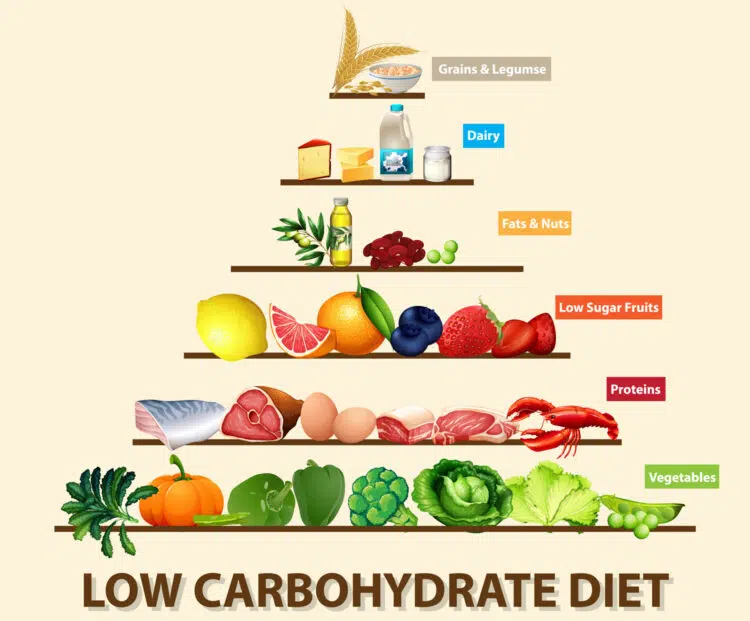Over the years, people have realized that their diets are crucial for achieving their fitness objectives.
However, this does not mean that everyone is headed in the right direction. A lack of knowledge about the correct dietary protocols is one of the primary reasons there are more fad diets than there are effective ones.
That said, low-carb diets are all the craze these days, as they promise rapid weight loss results.
Low-carb diets involve significantly limiting your daily carbohydrate intake (starches and sugar). Make no mistake, this is a significant shift as your body uses these compounds to produce energy.
Sticking to a low-carb diet for an extended period can drastically reduce your glycogen stores, leading to chronic fatigue and other health issues. In this article, we delve into the science behind low-carb diets and discover if they can deliver long-term results.
Science Behind Low-Carb Diet-Induced Weight Loss
Low-carb diets aren’t always restrictive in nature. You must replace the calorie deficit by bumping up your fat and protein intake to ensure optimal energy levels. Keto, Atkins, and Paleo are some of the most popular low-carb diet variations.
Cutting out a major chunk of carbohydrates from your diet will definitely help you shed the spare tire. But have you ever wondered how all this actually happens? Below is the real science behind these diets:
Ketosis
When you limit your carb intake, your body will ultimately run out of its glycogen stores. It will then switch over to using stored body fat for fuel. The process where ketones become the primary energy source is called ketosis. (1)
The great thing about ketosis is that it increases your metabolic rate, allowing your body to burn calories even when you are not physically active.
Lower Insulin Levels
Insulin is a hormone that helps your body store fat. However, when you switch to a low-carb diet, your insulin levels drop naturally. This can lead to your body releasing the stored fat and making the process of losing weight easier. (2)
Limited Appetite
One of the best things about eating more fats and protein is that you will feel fuller for longer. Many of my personal training clients report experiencing way fewer cravings after switching to a low-carb diet. (3)
Benefits & Drawbacks of a Low-Carb Diet
Assessing whether low-carb diets are effective for long-term weight loss isn’t that straightforward. Many experts believe low-carb diets are mainly designed for short-term weight loss goals. However, you can make minor adjustments to the diet to ensure prolonged adherence.
“Even though low-carb diets are not superior to other diets, for some people, they may find a low-carb diet is easy to follow, and they certainly are not worse than other diets, so if you enjoy it, then it’s absolutely a useful tool for fat loss,” said Dr. Layne Norton.
Given below are the near and long-term implications of adopting a low-carb lifestyle:
Long-Term Challenges of Limited Carb Intake
Consider these long-term side effects of low-carb diets:
- Nutrient Deficiencies: This shouldn’t come as a surprise. Carbs deliver vitamins, minerals, and fiber. Severely limiting carb intake for an extended period can lead to nutrient shortfalls.
- Sustainability Challenges: Make no mistake, cutting out carbs entirely from your diet won’t be a walk in the park. Besides dealing with cravings and temptations, you will also have to navigate social events that come your way.
- Negatively Affects Gut Health: Low-carb diets limit your fiber intake and can have a huge negative impact on your gut microbiome, digestion, and other digestive issues that can hinder your overall health.
- Other Health Risks: If you ask me, significantly limiting a particular macro or micronutrient in your diet isn’t a healthy long-term diet strategy. It exposes you to several health issues in the long term, like osteoporosis and kidney problems. (4)
Short-Term Advantages of Limited Carb Intake
The benefits include:
- Rapid Weight Loss: In my experience, limiting your carbohydrate intake can produce magnificent weight loss results in a very short period. This can be incredibly motivating for some people as they watch the numbers drop on the scale.
- Better Blood Sugar Levels: Carbs are usually the culprit behind blood sugar fluctuations. Diets like keto and Paleo can help stabilize your blood sugar levels, boosting your overall health and well-being.
- Promotes Cardiovascular Health: These diets can lead to lower triglycerides, increased HDL cholesterol, and sometimes even lower blood pressure. This trifecta can improve your heart health.
- Improved Energy Levels: A high-carb meal can weigh you down. Most of us have experienced an afternoon slump after a carb-laden lunch, which disrupts blood sugar levels. Many of my personal training clients report feeling more energized throughout the day on a low-carb diet.
- Lower Inflammation: Chronic inflammation can slow down your fitness transformation progress as it hinders your post-workout recovery. Low-carb diets can help tamp inflammation down, reducing the risk of type 2 diabetes.
- Enhanced Cognitive Function: High-carb meals can cause brain fog and sluggishness. I find that limiting carb intake during lunch makes me feel mentally sharp throughout the day.
I highly recommend consulting an experienced nutritionist before starting a low-carb diet to avoid any dire health consequences.
You must also consider multivitamins and fiber supplements to prevent essential nutrient deficiencies.
What Does Research Say
A medical review suggests that while short-term carb restriction lasting for a week can help you lose weight, it can lead to significant health issues if you adhere to it for an extended period.
Complications such as heart arrhythmias, cardiac contractile function impairment, sudden death, osteoporosis, kidney damage, increased cancer risk, impairment of physical activity, and lipid abnormalities can all be linked to long-term carb restriction. (5)
Plus, there is one major factor that you must consider.
A randomized controlled trial published in the prestigious New England Journal of Medicine concluded that folks on a low-carb diet lost more weight initially compared to those on a low-fat diet. However, the difference between the two groups after two years was minimal.
This suggests that the initial advantage of a low-carb diet fades over the long run. (6)
The Holy Grail: Calorie Deficit
A calorie deficit, which involves expending more calories than you consume in a day, is how you lose weight and the dreaded fat.
You don’t need fancy diets to achieve your weight loss goals as long as you are meeting your daily calorie deficit target. Experts believe running a 500 daily calorie deficit can result in a 1-pound weight loss over a week.
According to this, you can achieve your weight loss objective by switching to a non-restrictive diet like the Mediterranean diet instead of the low-carb option.
So, while the low-carb diet might help you quickly lose weight initially, other more balanced diet plans can be just as effective over the long term. Plus, these balanced diets require much less oversight and monitoring than overly restrictive diets.
Finding the Right Approach For Low-Carb Dieting
Consider the following factors while adopting the low-carb diet:
Exercise
Although we are mainly talking about dieting here, you must realize that exercising can help speed up your weight loss progress.
You don’t have to sign up for a high-end gym membership to move your body. Feel free to go outdoors for a 10 to 30-minute walk or engage in other activities that you enjoy, like swimming, dancing, or golf.
Exercising will not only boost your calorie expenditure, but it will also help reduce stress, boost hormone production, and improve sleep.
Adopt a Personalized Approach
Remember, the right approach for you will depend on individual factors like your age, gender activity, level levels, and fitness objectives. You must also factor in your lifestyle preferences before making a decision.
For instance, avoid picking a low-carb diet if the majority of your current eating routine comprises whole grains, like bread and pasta or fruits.
Similarly, elite athletes who rely on explosive power generation will have a hard time complying with the low-carb diet as they generally require high amounts of glycogen to function optimally and achieve peak performance levels.
Learn To Listen To Your Body
You must learn to listen to your body and avoid copying others blindly. What works for your training partner might not work for you due to genetic differences. Pay close attention to how your body reacts to a new diet and be proactive in making the necessary changes.
Finally, remember that it is about progress and not perfection. It is absolutely fine to let a little loose during a low-carb diet plan and eat a high-carb meal on a special occasion. Just make sure you don’t make a habit out of it. If possible, compensate for the higher carb intake by adjusting your future meals.
The key is to make healthier food choices in the long run.
Conclusion
So, there you have it, folks. While a low-carb diet might be incredibly effective for shedding a few quick kilos, it is not the most ideal approach for the long term. Nutrition experts recommend adopting a balanced diet to prioritize your overall health and well-being.
In the event that you want to employ a low-carb diet to drop weight quickly, you must do so with immense attention to detail and under expert supervision. Sticking to a low-carb diet and achieving your fitness goals requires dedication, discipline, and a solid plan.
If you have any questions about low-carb diets and how to implement them in your diet, post them in the comments below, and I’ll be happy to help!
References:
- Oh R, Gilani B, Uppaluri KR. Low-Carbohydrate Diet. [Updated 2023 Aug 17]. In: StatPearls [Internet]. Treasure Island (FL): StatPearls Publishing; 2024 Jan-. Available from: https://www.ncbi.nlm.nih.gov/books/NBK537084/
- Al-Reshed F, Sindhu S, Al Madhoun A, Bahman F, AlSaeed H, Akhter N, Malik MZ, Alzaid F, Al-Mulla F, Ahmad R. Low carbohydrate intake correlates with trends of insulin resistance and metabolic acidosis in healthy lean individuals. Front Public Health. 2023 Mar 16;11:1115333. doi: 10.3389/fpubh.2023.1115333. PMID: 37006572; PMCID: PMC10061153.
- Hu T, Yao L, Reynolds K, Niu T, Li S, Whelton P, He J, Bazzano L. The effects of a low-carbohydrate diet on appetite: A randomized controlled trial. Nutr Metab Cardiovasc Dis. 2016 Jun;26(6):476-88. doi: 10.1016/j.numecd.2015.11.011. Epub 2015 Dec 12. PMID: 26803589; PMCID: PMC4873405.
- Mitchell NS, Scialla JJ, Yancy WS Jr. Are low-carbohydrate diets safe in diabetic and nondiabetic chronic kidney disease? Ann N Y Acad Sci. 2020 Feb;1461(1):25-36. doi: 10.1111/nyas.13997. Epub 2019 Jan 15. PMID: 30644556; PMCID: PMC6629514.
- Bilsborough SA, Crowe TC. Low-carbohydrate diets: what are the potential short- and long-term health implications? Asia Pac J Clin Nutr. 2003;12(4):396-404. PMID: 14672862.
- Shai I, Schwarzfuchs D, Henkin Y, Shahar DR, Witkow S, Greenberg I, Golan R, Fraser D, Bolotin A, Vardi H, Tangi-Rozental O, Zuk-Ramot R, Sarusi B, Brickner D, Schwartz Z, Sheiner E, Marko R, Katorza E, Thiery J, Fiedler GM, Blüher M, Stumvoll M, Stampfer MJ; Dietary Intervention Randomized Controlled Trial (DIRECT) Group. Weight loss with a low-carbohydrate, Mediterranean, or low-fat diet. N Engl J Med. 2008 Jul 17;359(3):229-41. doi: 10.1056/NEJMoa0708681. Erratum in: N Engl J Med. 2009 Dec 31;361(27):2681. PMID: 18635428.
Tip: If you're signed in to Google, tap Follow.














